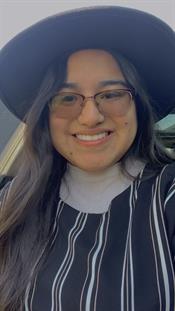Studying ‘abroad’ in the time of COVID
 No one signed up for their college experience to be interrupted by a global pandemic. Even more disappointing than a curtailed schedule of social and in-class activities was the dashed hope of those students wishing to study abroad. When teachers could not even go into local schools, how could they expect to face a class 5,000 miles away and on another continent?
Junior Nefris Chacha initially was hesitant to try a study abroad experience, but—ironically—the COVID-19 pandemic gave her the freedom to spend more than a month with students in Buenos Aires, Argentina, without leaving home.
No one signed up for their college experience to be interrupted by a global pandemic. Even more disappointing than a curtailed schedule of social and in-class activities was the dashed hope of those students wishing to study abroad. When teachers could not even go into local schools, how could they expect to face a class 5,000 miles away and on another continent?
Junior Nefris Chacha initially was hesitant to try a study abroad experience, but—ironically—the COVID-19 pandemic gave her the freedom to spend more than a month with students in Buenos Aires, Argentina, without leaving home.
“I have unfortunately not been to Buenos Aires in person,” she says. But “in the sense of student participation and interaction of staff, it truly felt like a study abroad experience. I was able to see firsthand the differences of the education system and morals of the Latin culture. I still felt the hospitality, care and respect through Zoom.” Nefris also got to explore the sights of Argentina vicariously, although she could not exactly taste the asado served across the South American nation. “I had some awesome instructors who would describe in detail certain areas of Argentina for me when students mentioned specific landmarks or locations. They would send me pictures or retell stories and experiences.”
Nefris’ own stories and experiences actually begin in yet a different place—between Argentina and the States. She lived in Mexico until she was six, and so she had to learn English starting in second grade—in fact, a teacher who stayed after school to help her planted the seed that would lead her to her current course of study as an Elementary Education and Learning Behavior Disorders major. Nefris had been apprehensive about the language barrier—think Americans putting on subtitles to follow a British costume drama—but in the end, her native language gave her the edge. “Though their dialect is more sing-songy and there are different expressions in Argentina compared to Mexican Spanish, the language basics are the same,” she says. “Because of having had Spanish as my first language, and using it often as a way of closing language barrier gaps for my parents and others, I was able to walk into those Zooms and understand every single word.” Her students and colleagues closed her own gaps by explaining local expressions, which Nefris found very helpful and even “embracing.”
Once in the virtual classroom, Nefris’ teaching was similar to being in a hybrid class at Bellarmine—only this time, she was the instructor. For the first three weeks of her five-week internship, she logged into Zoom and found her students either in a physical classroom or online, depending on their rotation that day. However, the last two weeks, the school was closed due to escalating COVID numbers and so both students and teachers went completely online. Still, she got a taste of the hybrid language learning in Buenos Aires schools. “In the morning, I sat and observed a Spanish government and Spanish grammar class,” she explains. “Even though I speak and could teach the classes in Spanish, due to schedule problems I wasn’t able to teach them—but I still enjoyed seeing the frenzy in which the same students I spoke to in English in the afternoon would participate in their Spanish classes.” Nefris’ afternoon schedule involved teaching four or five classes in English, including social studies, English grammar, and reading.
Nefris is still not eager to make the leap to a traditional study abroad internship, but she is open to visiting Buenos Aires one day. “I was able to get a lot of places instructors as well as students recommended for me to look into,” she says. “I am definitely hoping to take advantage of another study abroad opportunity online, but I might even be willing to try one out in person.” An online teaching abroad experience, she believes, can help hesitant students dip their toes into this change of scenery, if not the La Plata River. (Buenos Aires, like Louisville, has its own watery border; in fact, the river shares its name with a nearby city that happens to be one of Louisville’s sister cities.) “It may seem an untraditional way of ‘studying abroad,’ but there is still so much to learn from staff and the students, even if they are through a screen,” Nefris says. “You can’t change culture even through a screen. You can’t change morals or values of the people; it just enhances them even more because you’re attentively looking for the rhythm and qualities of the group. Even if you can’t be physically there with the directors, you can still intake a lot of valuable skills and passion from them.”
Nefris caught the passion, which grew over her five-week stint, as she found herself asking for more responsibilities, sitting in on meetings, and observing conferences to gain more skills and experiences—and still wanting more. “My co-teachers and school director...also shared their biggest struggles and advice for me as a future educator. They fueled my hunger for working with culturally diverse and ESL/ELL students. So go ahead and do it,” she advises aspiring educators unable or unwilling to leave town. “It’s worth it.”